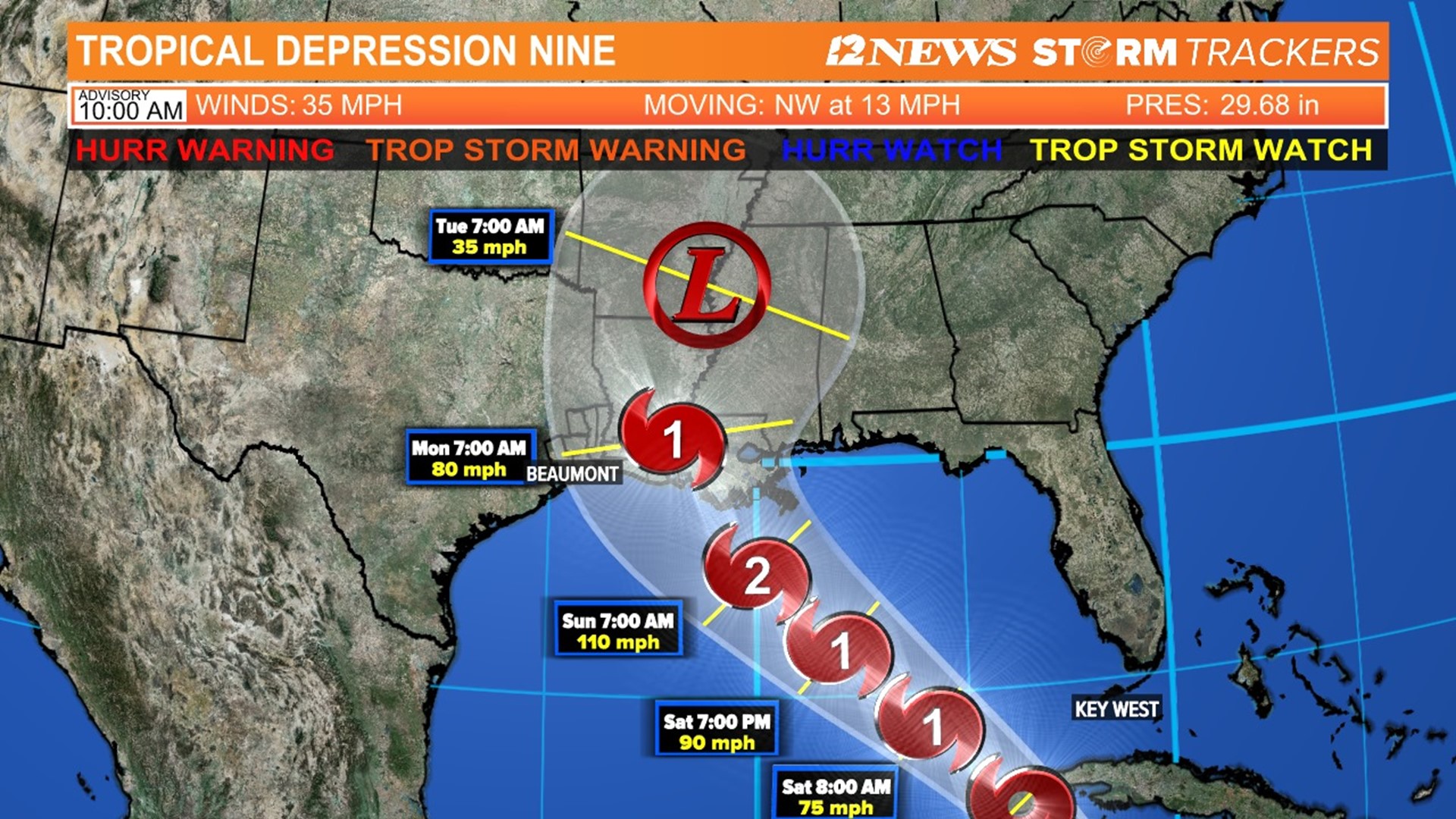BEAUMONT, Texas —
NOTE: This article is no longer being updated. Get the latest HERE.
The National Hurricane Center announced it is tracking Tropical Depression Nine in the west-central Caribbean Sea. It has issued its first advisory on the system, previously known as Invest 99L.
The NHC said at 4 p.m. they expect the depression to strengthen into a tropical storm soon.
The 12News StormTrackers are keeping a close eye on this disturbance because it will likely have impacts somewhere along the Gulf Coast. You can watch an update from Meteorologist Jeff Gerber in the video player above.
As of the 4 p.m. Central update Thursday, the "cone of uncertainty" has shifted farther east along the Louisiana and western Mississippi coast.
Atmospheric conditions are favorable for development. The next two storm names on the Atlantic list are Ida and Julian, and this system could be named later today.

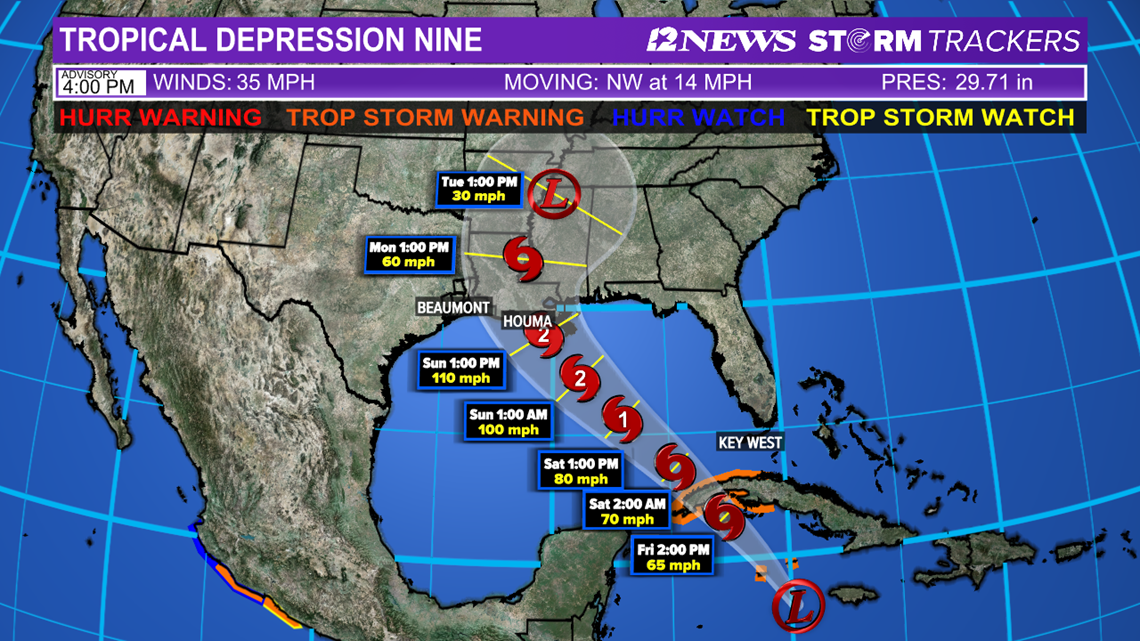

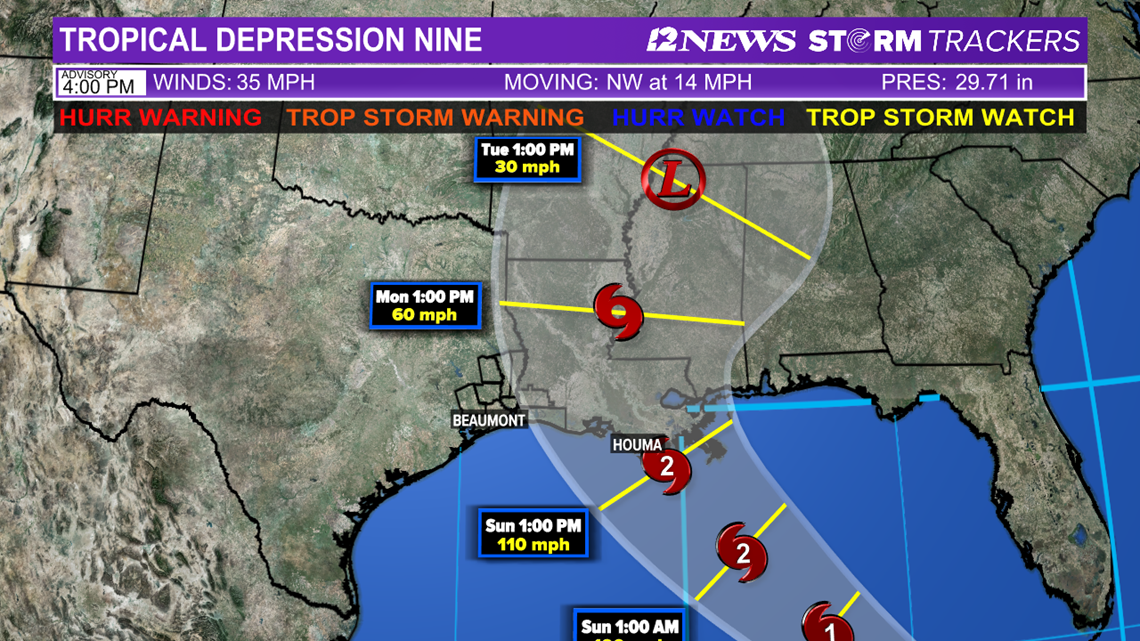
It is trending west-northwest through the Caribbean. The overall track, intensity and final landfall remain uncertain, but it's looking likely that it will be a hurricane.
Models are having a tough time understanding where this moisture is going to travel because it is hasn't developed yet. But the overall thinking as it moves west it will near the Gulf this weekend.
Many of the forecast models Thursday show the cone of uncertainty along the Louisiana coast, but it's too soon to know for sure. We'll keep you updated.
Thursday morning spaghetti models

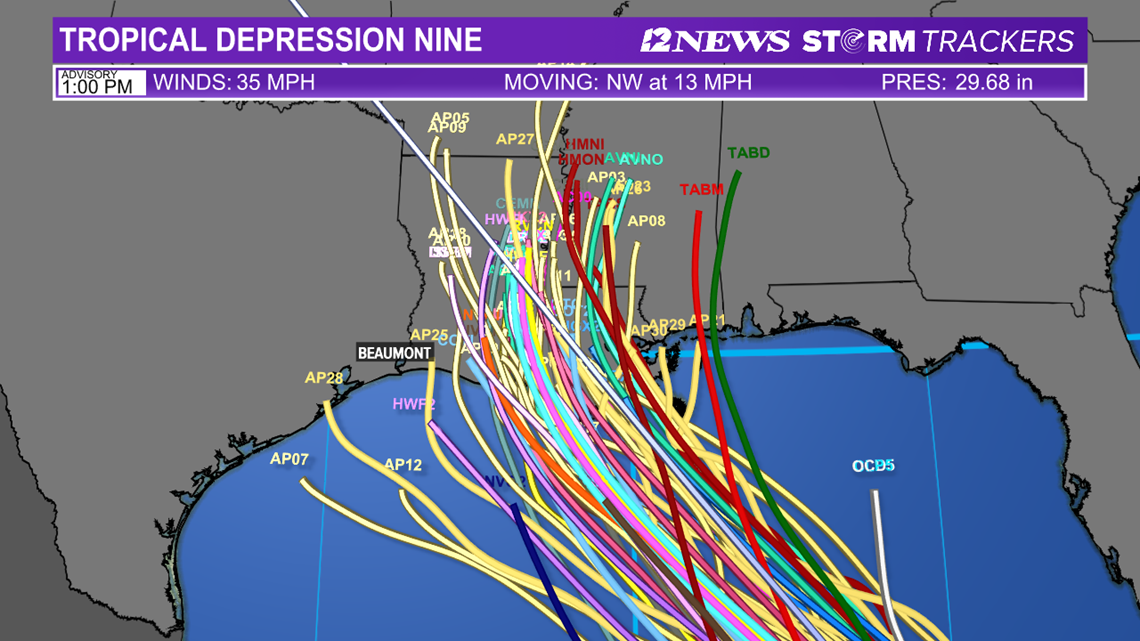
From the National Hurricane Center at 4 p.m. CDT...
At 500 PM EDT (2100 UTC), the center of Tropical Depression Nine was located near latitude 18.0 North, longitude 79.8 West.
The depression is moving toward the northwest near 14 mph (22 km/h), and this general motion should continue over the next few days.
On the forecast track, the center of the depression will pass near or over the Cayman Islands tonight, the Isle of Youth and western Cuba Friday, and over the southeastern and central Gulf of Mexico Friday night and Saturday.
The system is forecast to approach the U.S. northern Gulf coast on Sunday.
Maximum sustained winds are near 35 mph (55 km/h) with higher gusts. Steady strengthening is forecast during the next few days.
The depression is expected to become a tropical storm tonight, and become a hurricane when it is near western Cuba or over the southeastern Gulf of Mexico. Additional strengthening is likely over the Gulf of Mexico, and the system could be near major hurricane strength when it approaches the northern Gulf coast.
The estimated minimum central pressure from Air Force Reserve reconnaissance data is 1006 mb (29.71 inches).
2021 Hurricane Season Outlook
The 2021 Atlantic Hurricane Season is forecast to produce more storms than average. The reason for this is the lack of El Nino, which typically features more wind shear. We also expect warmer than average sea temperatures and an active West African Monsoon.

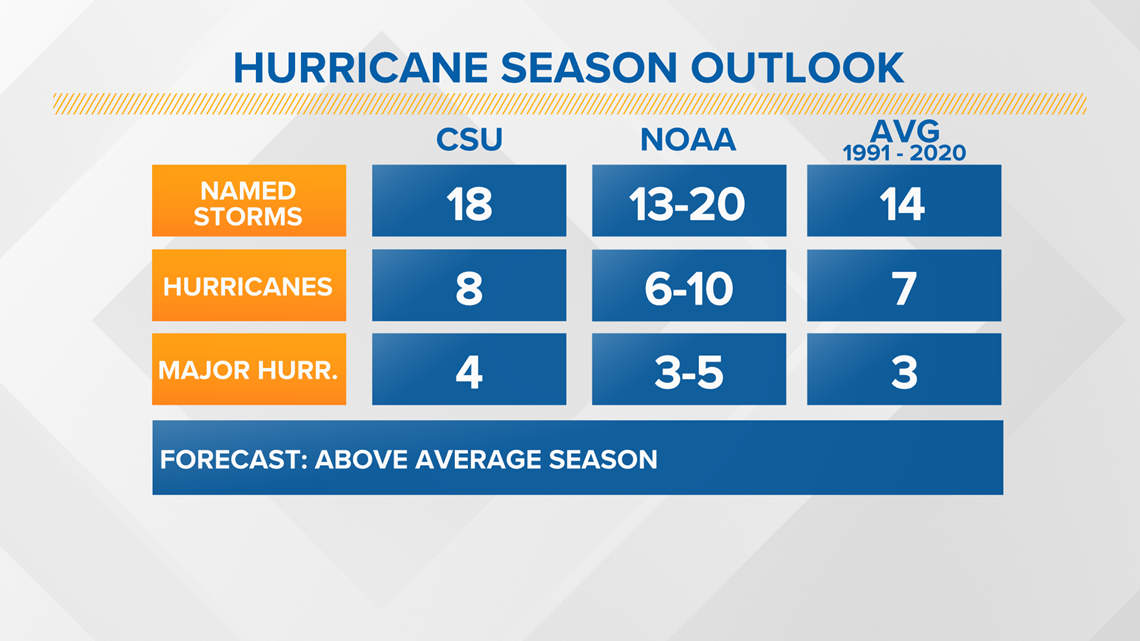
After a record-breaking 2020 hurricane season, we now know the Greek alphabet will no longer be used to name storms.
The World Meteorological Organization announced the Greek alphabet will not be used in the future because it "creates a distraction from the communication of hazard and storm warnings and is potentially confusing."

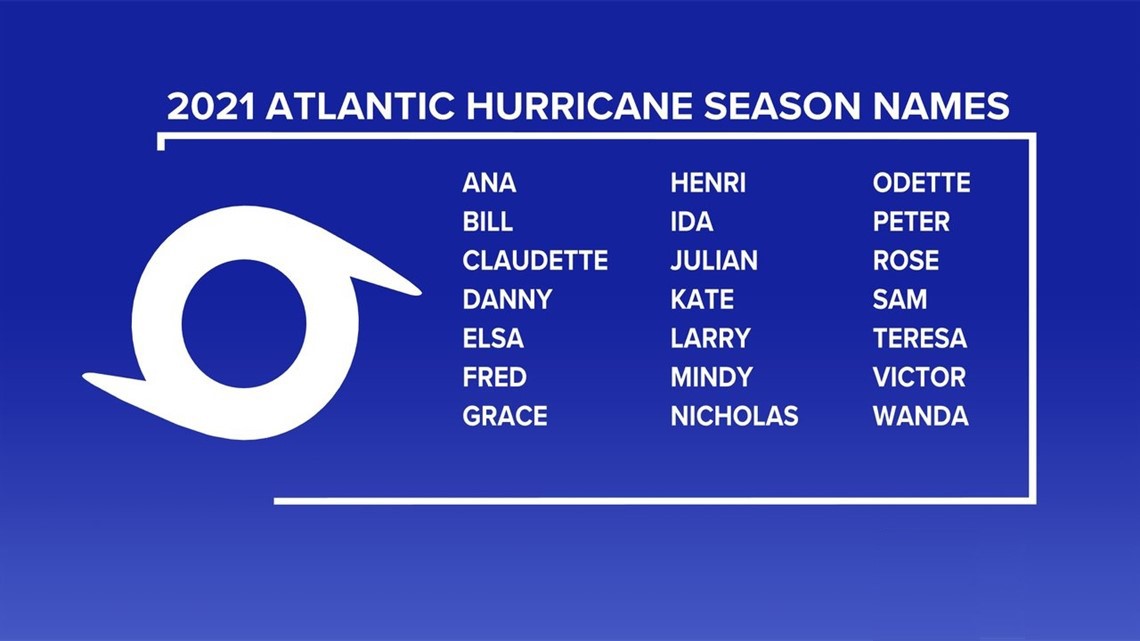
There has been only one other season that used the extra set of names, and that was in 2005. The World Meteorological Organization released a new set of supplemental names that will be used if the season exhausts the standard list.

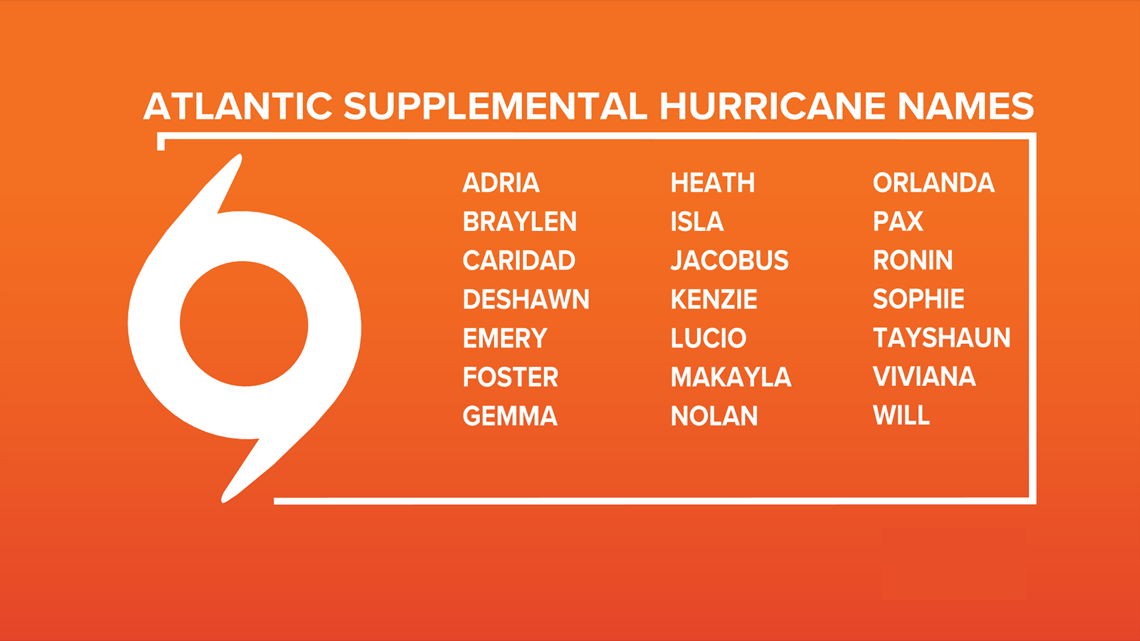
Be prepared if a storm comes our way
BEFORE THE STORM
- Make a home inventory
- Have a current copy of your declarations page that has your policy number and your agent's number
- Review your policy with your insurance agent to determine if you have adequate coverage
- Repair loose boards, shingles, shutters and downspouts to prevent them from becoming an issue in high winds or torrential rain
- Have an evacuation plan, and include plans for your pets
- Make sure your emergency equipment is in working order, including a battery-powered radio, flashlights and extra batteries. Also, make sure to gather all medicine, replenish your first-aid kit and stock a week's worth of non-perishable food and water
- Charge your cell phone and fill your car with gas
- Program all emergency phone numbers
DURING THE STORM
- If you are advised to evacuate, leave as soon as possible. Retain all related receipts - they may be considered in your claim. If you aren't in a recommended evacuation and you plant to stay home, stay informed by listening to weather alerts
- Keep windows and doors closed at all time, and, if possible, board them up with wooden or metal shutters
- Stay away from the windows and in the center of the room, or, stay in an interior room
- Avoid flood water, as it may be electrically charged from downed power lines
- Check on family members and friends
AFTER THE STORM
- Check to be sure your family members are safe
- If you did evacuate, wait for official notice that it is safe to re-enter your neighborhood and your house
- Document damaged property, and take photos and videos. Don't dispose of any damaged items without approval
- Keep a record of any temporary repairs or expenses to prevent further damage to your property.
GET NEWS & WEATHER ALERTS | Download the 12News App to your mobile device

